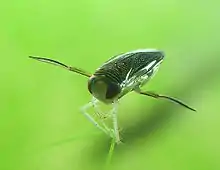Lesser water boatman
The lesser waterboatman or lesser water boatman (Corixa punctata) is a water-dwelling insect of the order Hemiptera.[1]
| Lesser water boatman | |
|---|---|
 | |
| Scientific classification | |
| Kingdom: | Animalia |
| Phylum: | Arthropoda |
| Class: | Insecta |
| Order: | Hemiptera |
| Family: | Corixidae |
| Genus: | Corixa |
| Species: | C. punctata |
| Binomial name | |
| Corixa punctata (Illiger, 1807) | |
Adults normally range in size from 5 to 15 mm long, and are found in ponds, lakes and sometimes even swimming pools. The boatman feeds on algae and dead plant material. They have long hind legs which they use to swim on top of water. These powerful legs are covered in tiny hairs which helps them float on the surface of the water.
They breathe oxygen by trapping air beneath their wing cases when they are on the surface as the oxygen is trapped by tiny hairs. They use trapped air in their physical gill to convert water-borne sounds into airborne sounds that they can hear.[2]
They are similar to Notonecta glauca, the back swimmer by appearance, although these lesser waterboatman are herbivores and swim on their fronts.[3] They are not related to Notonecta glauca, back swimmer, nor to the European Micronecta scholtzi, also known as the "lesser water boatman".
References
- Cheng, Lanna, ed. (1976). Marine Insects. (Scripps Institution of Oceanography Technical Report). Amsterdam, The Netherlands: North-Holland Publishing Company. pp. 267, 275, 279, 281. ISBN 0-444-11213-8.
- Prager, J.; Streng, R. (1982). "The resonance properties of the physical gill of Corixa punctata and their significance in sound reception". Journal of Comparative Physiology A. 148: 323–335. doi:10.1007/bf00679017.
- "Backswimmers". UK Safari. Archived from the original on 17 August 2013.
Further reading
- Banks, C.J. (1949). "The absorption of water by the eggs of Corixa punctata Illig. (Hemiptera, Corixidae) under experimental conditions." The Journal of Experimental Biology 26: 131–136.
- Short, J.R.T. (1953). "On the musculature of the legs of Corixa punctata (Illig.) Hemiptera." Proceedings of the Royal Entomological Society of London A 28: 31–35.